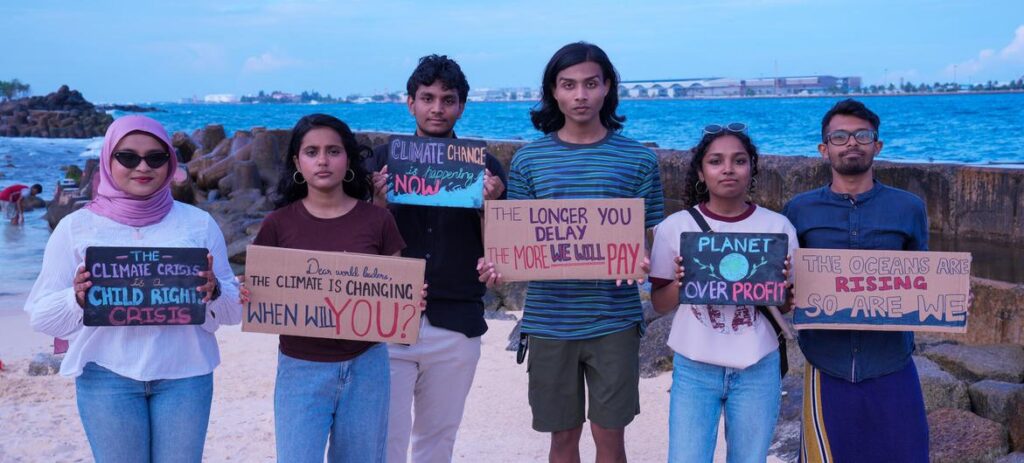
© UNICEF/Pun Young climate activists in Maldives highlight key messages, urging climate action.
Young leaders from around the world are sharing their visions and actions to advance sustainable development at a three-day meeting that opened on Tuesday at UN Headquarters in New York.
The Economic and Social Council (ECOSOC) Youth Forum provides a platform for young people to have a dialogue with diplomats on challenges affecting their well-being.
Discussions are centred around five of the 17 Sustainable Development Goals (SDGs) – ending poverty; zero hunger; climate action; peace, justice and strong institutions, and partnerships to make the goals reality.
Hope for better
These issues will be reviewed at ECOSOC’s High-Level Political Forum in July, the chamber’s president, Paula Narváez, said in her opening remarks.
Speaking in Spanish, she expressed commitment and faith in the world’s young people, whose enthusiasm and determination are crucial for building a better and more inclusive future for all.
“Your ideals are the music of humankind, which is not giving up hope – hope that better days will come,” she said.
Poverty limits prospects
Ms. Narváez noted that the global fight against poverty “is getting tougher”, with only one third of countries on the path to reducing numbers by the SDG deadline of 2030.
Today, seven per cent of the global population, 570 million people, are living in extreme poverty, she said, and young people account for “a significant part” of their ranks.
“We know that poverty seriously limits the prospects for development of our young people, thus perpetuating the cycle,” she said. “We have to do more for our young people, and part of the response is including them in public decisions.”
Energy and conviction
Addressing the forum, UN Secretary-General António Guterres said the energy and conviction of young people are infectious, and more vital than ever.
He used the occasion to again focus on the war in Gaza, sparked by the Hamas-led attacks on Israel on 7 October.
“It is high time for an immediate humanitarian ceasefire, the unconditional release of all hostages, the protection of civilians, and the unimpeded delivery of humanitarian aid,” he said, drawing applause from participants.
‘We need you’
In a world “bristling with challenges, tragedies and injustices – many of them linked”, he commended young people across the planet for standing up, speaking out and working for real change.
“We need you,” the Secretary-General said. “And I am fully committed to bringing young people into political decision-making; not just listening to your views but acting on them.”
This commitment has included establishing a new Youth Office at the UN and ensuring that young people have a strong role in the run-up to the Summit of the Future in September, which he called “a pivotal moment to turbocharge the SDGs, and reinvigorate multilateralism.”
The Secretary-General also saluted youth for being on the frontlines for bold climate action. He urged governments to adopt strong policies, including to accelerate the shift from fossil fuels to clean energy, and to create new national climate plans that align with the goal of limiting global warming to 1.5 degrees Celsius.
“And they need to bring young people into this work – meaningfully. The transition to renewables must be just, and it must be sustainable,” he said.
The power to dream
Sarah Baharaki, Global Youth Ambassador with the children’s education charity Theirworld, highlighted the situation in her homeland, Afghanistan, which she fled following the Taliban’s return to power three years ago.
The de facto authorities have banned young women from the workforce and attending school, but Afghan youth “refuse to remain silent” and are taking matters into their own hands by protesting and advocating for their rights, she said.
She noted that although education is vital in reducing poverty, conflict, and the climate crisis, over two million girls are barred from attending school in Afghanistan “and millions of others are in a state of uncertainty in Ukraine, Palestine and Sudan”.
With the SDG deadline just six years away, “it is the time to act and make right decisions because we are running late,” she said.
Ms. Baharaki stressed the need to involve youth in decision-making processes and called for greater support from governments, the private sector and civil society.
“Not only because we make up to 16 per cent of the world’s population,” she said, “or because we are the most educated generation so far, but because we have power – the power to dream for a better world and the courage and bravery to work and make these dreams a reality.”